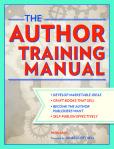
 Today we’re going to interview Nina Amir about how authors can and should write a business plan for their book. Nina is the author of How to Blog a Book and her new book, The Author Training Manual: Develop Marketable Ideas, Craft Books That Sell, Become the Author Publishers Want, and Self-Publish Effectively. Nina is also a sought after book and writing coach. Some of Nina’s clients have sold 300,000+ copies of their books, landed deals with major publishing houses and created thriving businesses around their books. She writes four blogs, self-published 12 books and founded National Nonfiction Writing Month, aka the Write Nonfiction in November Challenge.
Today we’re going to interview Nina Amir about how authors can and should write a business plan for their book. Nina is the author of How to Blog a Book and her new book, The Author Training Manual: Develop Marketable Ideas, Craft Books That Sell, Become the Author Publishers Want, and Self-Publish Effectively. Nina is also a sought after book and writing coach. Some of Nina’s clients have sold 300,000+ copies of their books, landed deals with major publishing houses and created thriving businesses around their books. She writes four blogs, self-published 12 books and founded National Nonfiction Writing Month, aka the Write Nonfiction in November Challenge.
Andy: Nina, welcome to “Ask the Agent.” Your new book, The Author Training Manual, was published this month by Writers Digest Books. Congratulations. Could you tell us something about it?
Nina: Thanks Andy. In the book I try to offer aspiring authors a process to help them produce marketable book ideas—ones that sell. The exercises it contains train them to become successful authors by helping them develop an Author Attitude, produce a business plan for their books and evaluate themselves and their ideas through the same lens used by agents and acquisitions editors. It is meant for all authors, whether they write fiction or nonfiction, plan to self-publish or traditionally publish..
Andy: What’s the one thing you feel an aspiring author can do prior to writing a book to help ensure they land an agent or publisher and, eventually, sell books?
Nina: The first thing I do when I work with authors is help them change their attitude. So many writers only want to write. However, to land an agent and then a publisher, and then to sell books, takes a willingness to be more than just a writer. In this media-driven world, you have to be a businessperson, which is something most writers have no interest in. Some have an aversion to it.
They have to change their attitude and learn to love the things they dislike—so they can do them well. Otherwise, they have to find other ways to get these things done, such as hire a virtual assistant, a publicist, or a social media expert. They have to learn to be tenacious if they aren’t already.
Once they have accepted the fact that writing means business, the next thing they must do is write a business plan for their book. And they should do that before they write a word of the manuscript.
Andy: What is a business plan for a book? How is it different from a book proposal?
Nina: A business plan is a lot like a book proposal. Normally what we call book proposals are business plans submitted to agents or publishers in a highly structured format. However, an indie author needs one, too. Actually, self-published authors need a plan even more than traditionally published authors.
Andy: Why is that?
Nina: As an indie author, you are the publisher. You create a start-up publishing company. There is no agent or acquisitions editor to determine for you if your book idea is a viable product. And you have no venture capital partner—no publisher to financially back your project. It’s your money at risk. So you want to have a business plan. Just like any other business. And in the publishing industry, traditional publishers launch 1,500 new products—books—per day. An indie publisher is competing with those books and the thousands launched per day by other indie publishers—300,000 per year. Your book better be up to that type of competition. A business plan helps you figure that out.
Andy: How does a business plan for a book differ from a book proposal?
Nina: When an author uses a business plan, it can differ from a book proposal in a variety of ways. It might include more information on competitive books for example, and how to angle or change the writer’s idea to make it more unique in the category or to offer more benefit to readers in the target market. That information gets used later when writing chapter summaries and in the actual manuscript.
It might include additional sections, such as a profit and loss statement; a list of potential subcontractors, for example, editors and designers; a timetable or time line for producing the book; information on legal steps to take; a detailed list of spin-offs or sequels; and products and services to help build a business around the book or to create a career and brand for the author. Additionally, it could include a resources-necessary-to-complete-the-book section, which used to be included in proposals but has fallen out of use. Here the author might determine how much money it will cost to produce the book, if she is self-publishing, or how much promotion might cost or freelance editing on the manuscript or proposal. This helps determine when the author is ready to move forward based on any potential financial restraints. If the author needs to crowdfund, this information could be included here, too.
Of course, a business plan would include the expected proposal sections, such as an overview, a market and competitive analysis, an author bio and platform statement, and a promotion plan. For fiction, it would have a synopsis. For nonfiction, it would have a table of contents and a chapter-by-chapter synopsis.
Andy: Can fiction writers use a nonfiction book proposal as the foundation of their business plan?
Nina: Yes, for sure. I think novels will have a better opportunity to sell well if authors take the time to consider whether their story lines are marketable. Unfortunately, many fiction writers are focused solely on craft. They do not want to dabble in business at all. A few create well-written books that do have compelling and previously untold stories that become bestsellers. What the majority of wannabe novelists don’t realize however, is that it’s one or two out of a million such novelists who create a New York Times bestseller. Thus, it behooves them to follow along in the footsteps of nonfiction writers and figure out how to craft a wonderfully written and marketable story—one that is unique and necessary in a target market or category.
Andy: What makes a business plan so essential to the success of a book?
Nina: It helps aspiring authors evaluate their ideas through the same lens used by agents and acquisitions editors. Most writers slap them together because they must. But if you compose it with the desire to seriously and objectively evaluate your idea and make it better—make it an idea with the greatest selling potential possible—then you go through the process of creating a successful book.
That’s why a business plan, or a proposal, provides the cornerstone of the traditional publishing process. An acquisitions editor will use this to determine if an aspiring author is a good publishing partner—a good business partner—and if the idea is a viable one—one worth investing in. They don’t want to take a risk. They want to put their money on a sure bet. And the information in the business plan helps them make that determination.
